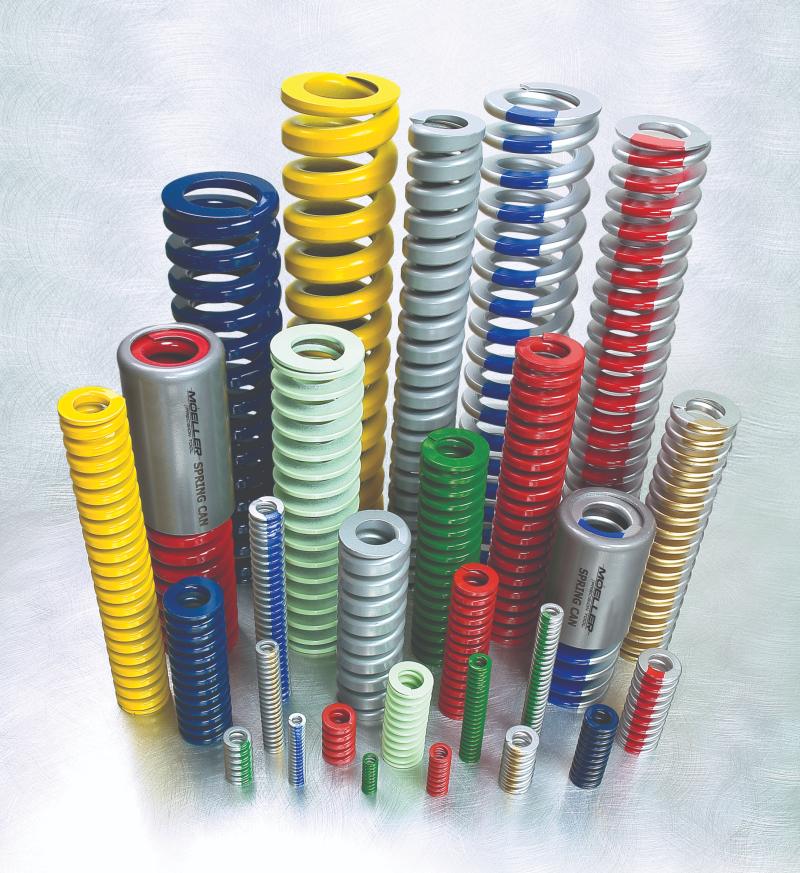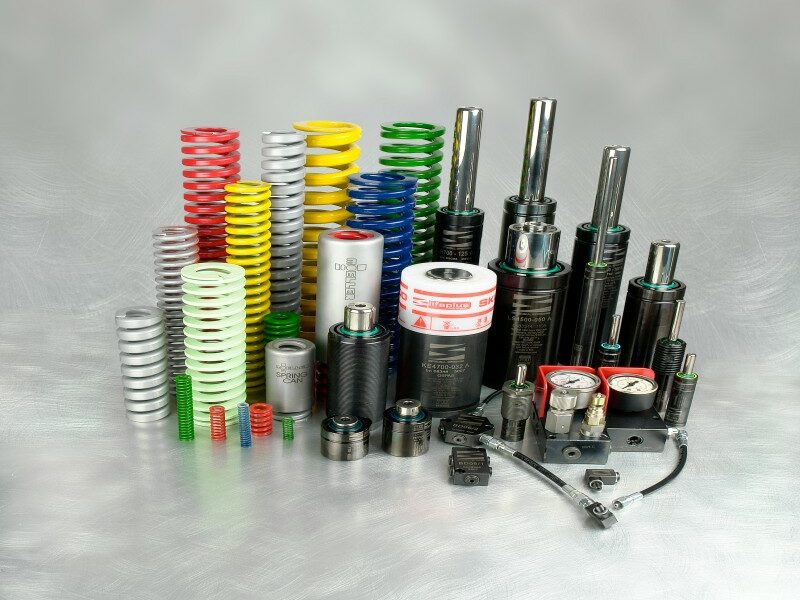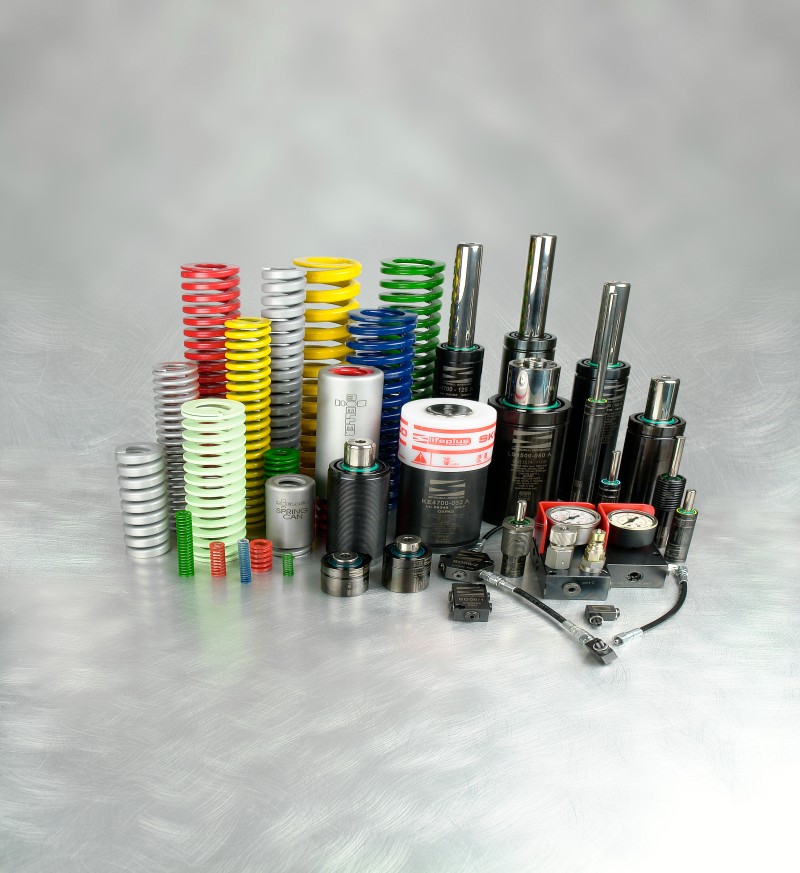There are many components that a metal stamping die needs in order to function accurately and efficiently. In this article, we’ll discuss one category of them: die springs.
What Is a Die Spring?
A die spring is a helical, high-force compression spring that’s designed to provide a predetermined amount of pressure at any given compression point. It supplies the force needed to hold a metal sheet in place while it’s being worked on in metal stamping processes.
Die springs are tough components. They’re capable of withstanding very high compression loads, sometimes 30% more load than traditional compression springs. They’re also effective in extreme conditions, like high or low temperatures.
While they’re most commonly used in metal stamping, die springs are also known to be reliable components for applications like injection molding, custom machining, and original equipment manufacturer (OEM) manufacturing.
Mechanical Springs vs. Nitrogen Gas Springs for Dies: What’s the Difference?
There are various types of die springs, all with their own advantages and disadvantages. But mechanical and nitrogen gas die springs are by far the two most common. Let’s take a look at the differences between them.
Mechanical Die Springs
Mechanical die springs are the standard form of die spring. Also known as wire coil springs, these die springs feature a circular, oval/trapezoidal, or rectangular wire shape. They store energy by trying to keep two components separate when a compression load is applied.

Some benefits of mechanical die springs are:
- They’ve been around forever. As the “original” type of die spring, they’ve been recognized as the tried-and-true, standard component by many tool and die manufacturers.
- They come in various load options. With different coil shapes and wire sizes, mechanical die springs are available in load options from light to ultra-heavy.
- They’re cheaper up front. Mechanical die springs are sold at affordable prices.
However, there can be some drawbacks to mechanical die springs, especially for more intense applications. A few of them are:
- They may not be as durable. Especially in hostile environments and conditions, mechanical die springs may not perform with as much strength.
- You may need to use more of them. Due to lowered strength, you may need to implement a higher volume of mechanical die springs.
- They may need to be replaced more often. Also due to lowered strength, you may need to replace your mechanical die springs more often to achieve desired performance.
Nitrogen Gas Die Springs
Nitrogen gas die springs use compressed nitrogen gas to exert force within a die. The nitrogen gas is contained in a cylinder and compressed with a piston rod. They’re often used in place of mechanical springs, and are known for their ability to store additional energy and exert greater force.
A few benefits of nitrogen gas die springs are:
- They’re safer. Nitrogen gas die springs are engineered with various additional safety features, including: Over Stroke Active Safety (OSAS), Uncontrolled Speed Active Safety (USAS), Over Pressure Active Safety (OPAS), and Active Protection from Contaminants (SKUDO).
- They’re stronger. Compressed nitrogen helps these die springs produce greater force compared to standard mechanical die springs. This means you can use less of them to meet certain load requirements.
- They last longer. With added strength comes increased durability and lifetime. You won’t need to replace nitrogen gas die springs as often.
- They’re more economical in the long run. Nitrogen gas die springs may cost more upfront, but their enhanced safety and performance features make them more cost-effective in the long run.
Nitrogen gas die springs are generally a bit more expensive than their mechanical counterparts. However, that’s just taking upfront cost into consideration. When you think about their bolstered safety and longevity, they often turn out to be a more cost-effective choice in the long run.
Mechanical Springs vs. Nitrogen Gas Springs for Dies: Which Is Best for My Application?
Now, with all that information, you’re probably starting to wonder which of these die spring options is best. The truth? There’s not necessarily a right or wrong answer — but there may be a better option for you, depending on your unique application.
Here are some instances where one die spring option may be preferred over another.
Use mechanical die springs if…
- you’re working with high-speed dies.
- you’re working with simpler dies that don’t have a lot of stripper-pad travel.
- you’re working with flat parts that don’t have a lot of form in them.
- your tools require short strokes.
Use nitrogen gas die springs if…
- you’re working with more complex dies.
- your dies don’t have the space to use as many mechanical die springs as needed.
- you’re working with extremely high-force or heavy-duty loads.
- you’re working in extreme conditions (temperature, etc.).
If you’re still not sure which type of die spring is right for you, your best bet is to get in touch with a trusted die component manufacturer, like Moeller Precision Tool. We’ll listen to your unique needs and recommend the product that will deliver the highest-quality results.
Get Top-Tier Mechanical and Nitrogen Gas Die Springs at Moeller Precision Tool
At Moeller Precision Tool, we carry a large inventory of mechanical and nitrogen gas springs for dies — all in various shapes, sizes, and load levels. Our die springs are interchangeable with competitive brands and meet ISO, US, European, and Asian quality standards.
Moeller’s Mechanical Die Spring Options
Our mechanical die springs are available in the following styles:
- Rectangle wire (ISO standard)
- Oval wire (US standard) – Check out our new-and-improved “R” series designs here!
- Round wire (US standard)
Moeller’s Nitrogen Gas Die Spring Options
In conjunction with our partners at Special Springs, we’re excited to offer top-quality nitrogen gas die springs. These springs are available in hundreds of models, sizes, load levels, stroke lengths, and mounting options — and they’re some of the safest die springs on the market. Learn more about them on Special Springs’s website.
If you’re ready to request a die spring quote for your application, reach out to our team online.


